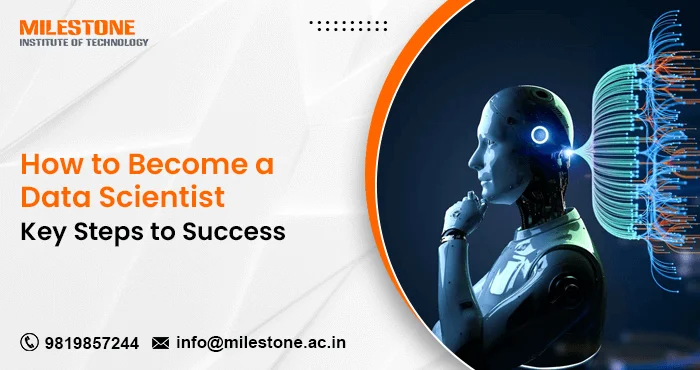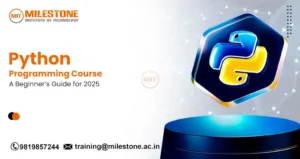Data scientists are becoming more and more important in today’s big data world in various industries. There is a great need for qualified data scientists because businesses are using data that will help them in making choices. This article “
How to Become a Data Scientist: Key Steps to Success” will help you understand all the essential steps needed to become a successful data scientist.
What is a Data Scientist?
Before delving into the steps to become a data scientist, it’s crucial to understand the role itself. A data scientist is an expert who helps businesses make decisions by analyzing and interpreting large, complicated data sets. They use a combination of statistical knowledge, programming skills, and domain expertise to extract valuable insights from data.
What Skills Do Data Scientists Need?
- Analytical Skills: Data scientists must possess a keen analytical mindset to interpret complex datasets and draw meaningful conclusions.
- Programming Proficiency: Proficiency in programming languages like Python or R is essential for data manipulation, analysis, and model implementation.
- Statistical Knowledge: A solid foundation in statistics enables data scientists to apply statistical techniques to analyze data and validate hypotheses.
- Machine Learning Expertise: Understanding machine learning algorithms and their applications is crucial for building predictive models.
- Data Cleaning and Munging: Data is often messy, and data scientists need the skills to clean and preprocess data effectively.
- Data Visualization: Communicating findings to non-technical stakeholders is vital, and data visualization skills help in presenting complex information in a clear and concise manner.
- Domain Knowledge: Having domain-specific knowledge enhances the ability to derive actionable insights tailored to a particular industry.
How to Acquire the Necessary Skills?
Now that we’ve outlined the essential skills for a data scientist, let’s explore how to acquire them.
How to Develop Analytical Skills
- Practice Problem Solving: Engage in regular problem-solving exercises, whether through coding challenges or real-world scenarios. Platforms like Kaggle offer a variety of datasets and competitions to hone your analytical skills.
- Participate in Data Science Projects: Working on real projects provides hands-on experience and helps you develop a problem-solving mindset.
How to Learn Programming for Data Science
- Online Courses and Tutorials: Platforms like Coursera, edX, and Udacity offer comprehensive courses in programming languages commonly used in Data Science, such as Python and R.
- Interactive Coding Platforms: Utilize platforms like Codecademy and DataCamp to practice coding in a hands-on, interactive environment.
- Build Projects: Apply your programming skills by working on data science projects. This practical experience is invaluable in reinforcing what you’ve learned.
How to Gain Statistical Knowledge
- Online Courses and Books: Take online courses or read books on statistics to build a strong foundation. Resources like “An Introduction to Statistical Learning” are excellent starting points.
- Practice with Real Data: Apply statistical concepts to real-world datasets to reinforce your understanding and develop practical skills.
How to Acquire Machine Learning Expertise
- Enroll in Machine Learning Courses: Platforms like Coursera and Stanford Online offer courses by renowned experts, such as Andrew Ng’s Machine Learning course.
- Implement ML Algorithms: Apply your knowledge by implementing machine learning algorithms on datasets. Platforms like Kaggle and UCI Machine Learning Repository provide datasets for practice.
How to Master Data Cleaning and Munging
- Learn Data Cleaning Techniques: Familiarize yourself with tools and techniques for data cleaning, such as using Pandas in Python.
- Work on Messy Datasets: Practice cleaning and preprocessing messy datasets to develop expertise in handling real-world data challenges.
How to Develop Data Visualization Skills
- Use Visualization Libraries: Learn popular data visualization libraries like Matplotlib and Seaborn for Python or ggplot2 for R.
- Create a Portfolio: Build a portfolio showcasing your data visualization projects. This not only demonstrates your skills but also serves as a tangible representation of your work.
How to Gain Domain Knowledge
- Industry-Specific Courses: Take courses or attend workshops that provide insights into the specific industries you are interested in. Understanding the nuances of the industry enhances your ability to extract meaningful insights.
- Networking: Engage with professionals in the industry through networking events, conferences, or online forums. This exposure can provide valuable insights and help you understand the challenges and opportunities within the domain.
What Educational Background is Ideal?
While a specific educational background is not mandatory, certain degrees can provide a solid foundation for a career in
data science.
What Degrees are Relevant?
- Computer Science or Engineering: A degree in computer science or a related field equips you with programming skills and a strong foundation in algorithms.
- Statistics or Mathematics: Degrees in statistics or mathematics provide a solid grounding in statistical concepts, a crucial aspect of data science.
- Data Science or Analytics: Some universities offer specialized degrees in data science or analytics, covering a range of relevant topics.
How to Bridge Educational Gaps

If your current educational background is not directly related to data science, don’t worry. There are ways to bridge the gap.
How to Gain Practical Experience
- Join Institutes and Training Centers: Enroll in data science institutes or training centers that offer practical, hands-on courses. Milestone Institute of Technology provides real-world projects and simulations, allowing you to apply your skills in a structured learning environment.
- Internships: Seek internships in data-related roles to gain hands-on experience and apply theoretical knowledge to real-world problems.
- Freelance Projects: Take on freelance data science projects to build a portfolio and demonstrate your skills to potential employers.
How to Stay Updated with Evolving Technologies
Data science is a dynamic field that is always evolving due to new technology. Staying updated is crucial for long-term success.
How to Stay Informed
- Subscribe to Newsletters: Subscribe to newsletters from reputable sources like KDnuggets and Towards Data Science to stay informed about the latest trends, tools, and research in data science.
- Attend Conferences and Meetups: Participate in data science conferences, webinars, and local meetups to connect with professionals and stay abreast of industry developments.
How to Build a Professional Network?
Developing a robust professional network is important for boosting a career. Networking provides opportunities for collaboration, mentorship, and exposure to different perspectives within the field.
How to Network Effectively
- LinkedIn: Create a compelling LinkedIn profile showcasing your skills, projects, and aspirations. Connect with professionals in the field and join relevant groups.
- Attend Industry Events: Attend conferences, workshops, and meetups to meet fellow professionals and establish meaningful connections.
How to Seek Mentorship
- Online Platforms: Platforms like LinkedIn and Mentorscape connect aspiring data scientists with experienced professionals who can provide guidance and mentorship.
- University Alumni Networks: Leverage your university’s alumni network to connect with graduates working in the field of data science.
How to Prepare for Job Interviews?

Securing a job as a data scientist often involves a rigorous interview process. Preparation is key to success.
How to Prepare for Technical Interviews
- Practice Coding Challenges: Platforms like LeetCode and HackerRank offer coding challenges that simulate technical interview scenarios.
- Review Fundamentals: Brush up on fundamental concepts in statistics, machine learning, and data manipulation.
How to Showcase Your Skills
- Build a Portfolio: Create a portfolio showcasing your projects, including detailed explanations of the problems you tackled, your approach, and the outcomes.
- Case Studies: Develop case studies (DIGIT CLASSIFICATION USING ANN)
Where to learn Data Science Course?
Now that you’ve equipped yourself with the essential skills, you might be wondering where to enroll in a comprehensive
data science course. One reputable institution that offers a top-notch program is the Milestone Institute of Technology. Dive into a transformative learning experience where cutting-edge curriculum, expert faculty, and hands-on projects converge to shape skilled data scientists. Elevate your expertise and embark on a rewarding journey in the dynamic field of data science with Milestone Institute of Technology.

 If your current educational background is not directly related to data science, don’t worry. There are ways to bridge the gap.
If your current educational background is not directly related to data science, don’t worry. There are ways to bridge the gap.
 Securing a job as a data scientist often involves a rigorous interview process. Preparation is key to success.
Securing a job as a data scientist often involves a rigorous interview process. Preparation is key to success.



